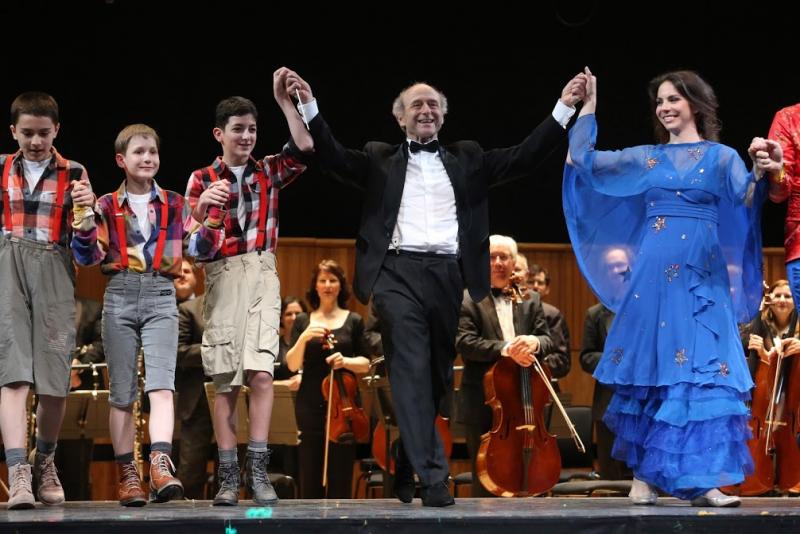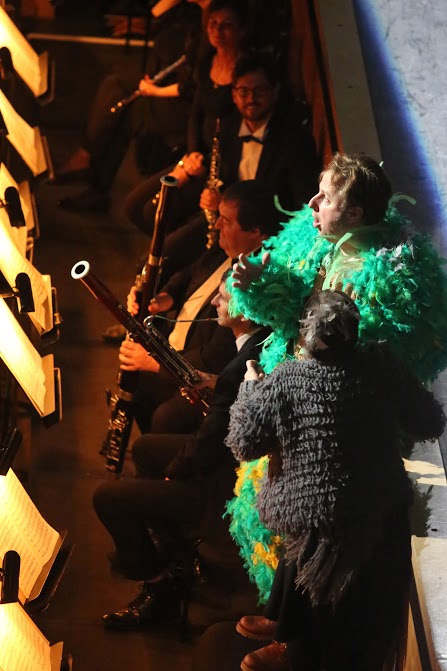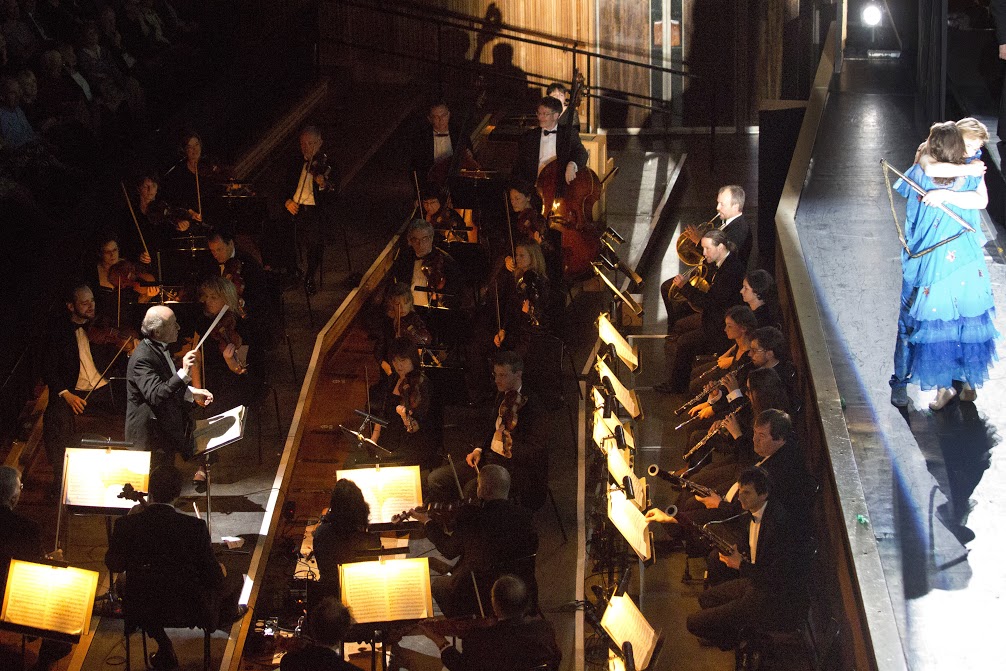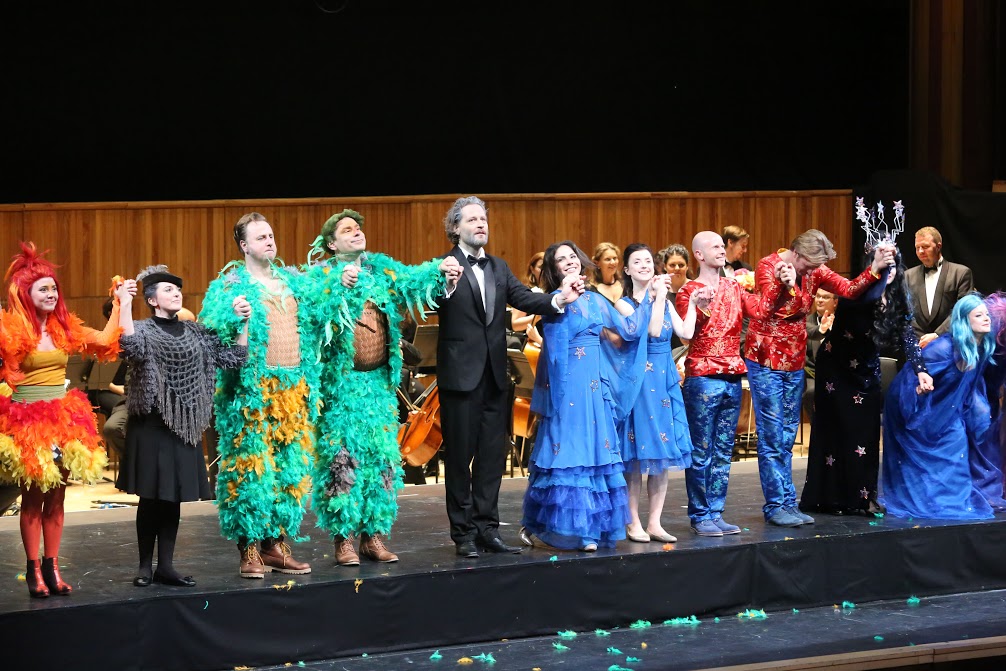Die Zauberflöte, Budapest Festival Orchestra, Fischer, RFH | reviews, news & interviews
Die Zauberflöte, Budapest Festival Orchestra, Fischer, RFH
Die Zauberflöte, Budapest Festival Orchestra, Fischer, RFH
Pretty-as-a-picture staging, but singers don't often equal conductor and players

Sunlit golden mean or slightly hazy middle-of-the-road? Conductor-director Iván Fischer's fully costumed and imagined concert of The Magic Flute - or perhaps it would better have been titled Die ZauberFlute given its intelligent mix of sung German and English dialogue taken by six excellent young British-based actors - was always going to be hard pressed to match the recent, hyper-communicative English National Opera/Complicite revival.
In fact, its concept shaped up rather well in comparison. But whereas ENO had at least two world-class singers in the Tamino of Allan Clayton and Lucy Crowe's Pamina, last night's was a cast you'd have been happy to catch in a regional German opera house, but not, with one exception, up to the standards of the greatFischer and his Budapest Festival Orchestra, unfathomably beleaguered by a cut of three quarters to its municipal grant. The capital of Hungary, a country in the grip of a very unenlightened regime, clearly wants to punish the outspoken Fischer and one of the world's most distinctive-sounding orchestras.
 The initial approach, once past the conductor's charming introductory pretence that the actors were pulled straight out of the audience (pictured right: Bart van der Schaaf's speaker-Papageno with the Old Woman), was broader than that of ENO's Mark Wigglesworth, but superbly articulate once the Allegro got going, and took on a different colour as the Overture's development heads into the woods. This was a lightish, deft approach, the woodwind feminine or a bit pale according to taste, but always alert.
The initial approach, once past the conductor's charming introductory pretence that the actors were pulled straight out of the audience (pictured right: Bart van der Schaaf's speaker-Papageno with the Old Woman), was broader than that of ENO's Mark Wigglesworth, but superbly articulate once the Allegro got going, and took on a different colour as the Overture's development heads into the woods. This was a lightish, deft approach, the woodwind feminine or a bit pale according to taste, but always alert.
It was a bit of a shame that the scores's two most serious moments, fully realised by Fischer, were undermined by the children's-picture-book images on the big screen. When hero Tamino faces endless night and is told that it will come to an end "soon - or never", we need a more daunting image than the naive temple-gate illustrations; Ingmar Bergman, who described this as "music at the outer limits of existence", started his genius film in rococo prettiness, only to dissolve it once Tamino sets out on his journey. Here we got the shadows and half the orchestra backstage for Sarastro's brotherhood in Act Two, but reverted to Tolkienesque mountains for the trials of fire and water. Even so, Fischer left us in no doubt of the music's depths - respectively mysterious and Bach-majestic - at both points. His Tamino did well with the first moment of crisis, too. Bernard Richter's handsome hero was too much the light lyric to pull out the dramatic stops when he needed to turn Heldentenor. His best moments were reacting to the flute's animal-charming and in the quintets, graced by three top-notch Ladies and a Lieder-quality Papageno from Hanno Müller-Brachmann, the finest principal in the cast. Hanna-Elisabeth Müller's Pamina (embracing Richter's Tamino onstage, pictured above) had the clarity but not the bloom around the voice. Krisztián Cser's Sarastro needed more support to sustain a line in his second-act arias and Mandy Friedrich's Queen of the Night had the notes - just, though the ornamentations were approximate - but not the fierce demeanour, stepping out of her moon-chariot in Act One and swishing around like an indifferent Russian mail-order bride.
Even so, Fischer left us in no doubt of the music's depths - respectively mysterious and Bach-majestic - at both points. His Tamino did well with the first moment of crisis, too. Bernard Richter's handsome hero was too much the light lyric to pull out the dramatic stops when he needed to turn Heldentenor. His best moments were reacting to the flute's animal-charming and in the quintets, graced by three top-notch Ladies and a Lieder-quality Papageno from Hanno Müller-Brachmann, the finest principal in the cast. Hanna-Elisabeth Müller's Pamina (embracing Richter's Tamino onstage, pictured above) had the clarity but not the bloom around the voice. Krisztián Cser's Sarastro needed more support to sustain a line in his second-act arias and Mandy Friedrich's Queen of the Night had the notes - just, though the ornamentations were approximate - but not the fierce demeanour, stepping out of her moon-chariot in Act One and swishing around like an indifferent Russian mail-order bride.
Admirably, there was no miking for the keen projection of the actors - dominated by Bart van der Schaaf's genuinely funny, natural Papageno-in-speech, briefly and wittily usurped by Müller-Brachmann in the second encounter with Papagena-as-old-woman - nor the Three Boys, drawn from the Hungarian State Opera Children's Chorus and charmingly playing the lions' parts too. Charming, too, to learn that Fischer sang the role of Second Boy at the age of 12. What he described as a "staged concert" never went for overkill in treating the Flute as pure fairy-tale (another curtain call ensemble with singers and their actor-doubles pictured below). The tricks with players and chorus behind the screen for the Brotherhood's councils were clever - they certainly made you realise Mozart's selective orchestration when the upper half of the ensemble was sitting down in the pit - but recessed the choral sound and dimmed its full impact. Still, who couldn't be moved by the final revelation of full orchestra finally translated to the stage at the end, kissed and beflowered by the reunited Tamino and Pamina? Mozart's message, that music unites us all, is timeless, and Fischer, as well as being a master technician among conductors, is one of its most inspiring ambassadors in the world today. Shame on the Budapest politicians for messing with his great orchestra.
The tricks with players and chorus behind the screen for the Brotherhood's councils were clever - they certainly made you realise Mozart's selective orchestration when the upper half of the ensemble was sitting down in the pit - but recessed the choral sound and dimmed its full impact. Still, who couldn't be moved by the final revelation of full orchestra finally translated to the stage at the end, kissed and beflowered by the reunited Tamino and Pamina? Mozart's message, that music unites us all, is timeless, and Fischer, as well as being a master technician among conductors, is one of its most inspiring ambassadors in the world today. Shame on the Budapest politicians for messing with his great orchestra.
rating
Explore topics
Share this article
The future of Arts Journalism
You can stop theartsdesk.com closing!
We urgently need financing to survive. Our fundraising drive has thus far raised £49,000 but we need to reach £100,000 or we will be forced to close. Please contribute here: https://gofund.me/c3f6033d
And if you can forward this information to anyone who might assist, we’d be grateful.

Subscribe to theartsdesk.com
Thank you for continuing to read our work on theartsdesk.com. For unlimited access to every article in its entirety, including our archive of more than 15,000 pieces, we're asking for £5 per month or £40 per year. We feel it's a very good deal, and hope you do too.
To take a subscription now simply click here.
And if you're looking for that extra gift for a friend or family member, why not treat them to a theartsdesk.com gift subscription?
more Opera
 Albert Herring, English National Opera review - a great comedy with depths fully realised
Britten’s delight was never made for the Coliseum, but it works on its first outing there
Albert Herring, English National Opera review - a great comedy with depths fully realised
Britten’s delight was never made for the Coliseum, but it works on its first outing there
 Carmen, English National Opera review - not quite dangerous
Hopes for Niamh O’Sullivan only partly fulfilled, though much good singing throughout
Carmen, English National Opera review - not quite dangerous
Hopes for Niamh O’Sullivan only partly fulfilled, though much good singing throughout
 Giustino, Linbury Theatre review - a stylish account of a slight opera
Gods, mortals and monsters do battle in Handel's charming drama
Giustino, Linbury Theatre review - a stylish account of a slight opera
Gods, mortals and monsters do battle in Handel's charming drama
 Susanna, Opera North review - hybrid staging of a Handel oratorio
Dance and signing complement outstanding singing in a story of virtue rewarded
Susanna, Opera North review - hybrid staging of a Handel oratorio
Dance and signing complement outstanding singing in a story of virtue rewarded
 Ariodante, Opéra Garnier, Paris review - a blast of Baroque beauty
A near-perfect night at the opera
Ariodante, Opéra Garnier, Paris review - a blast of Baroque beauty
A near-perfect night at the opera
 Cinderella/La Cenerentola, English National Opera review - the truth behind the tinsel
Appealing performances cut through hyperactive stagecraft
Cinderella/La Cenerentola, English National Opera review - the truth behind the tinsel
Appealing performances cut through hyperactive stagecraft
 Tosca, Royal Opera review - Ailyn Pérez steps in as the most vivid of divas
Jakub Hrůša’s multicoloured Puccini last night found a soprano to match
Tosca, Royal Opera review - Ailyn Pérez steps in as the most vivid of divas
Jakub Hrůša’s multicoloured Puccini last night found a soprano to match
 Tosca, Welsh National Opera review - a great company reduced to brilliance
The old warhorse made special by the basics
Tosca, Welsh National Opera review - a great company reduced to brilliance
The old warhorse made special by the basics
 BBC Proms: The Marriage of Figaro, Glyndebourne Festival review - merriment and menace
Strong Proms transfer for a robust and affecting show
BBC Proms: The Marriage of Figaro, Glyndebourne Festival review - merriment and menace
Strong Proms transfer for a robust and affecting show
 BBC Proms: Suor Angelica, LSO, Pappano review - earthly passion, heavenly grief
A Sister to remember blesses Puccini's convent tragedy
BBC Proms: Suor Angelica, LSO, Pappano review - earthly passion, heavenly grief
A Sister to remember blesses Puccini's convent tragedy
 Orpheus and Eurydice, Opera Queensland/SCO, Edinburgh International Festival 2025 review - dazzling, but distracting
Eye-popping acrobatics don’t always assist in Gluck’s quest for operatic truth
Orpheus and Eurydice, Opera Queensland/SCO, Edinburgh International Festival 2025 review - dazzling, but distracting
Eye-popping acrobatics don’t always assist in Gluck’s quest for operatic truth
 MARS, Irish National Opera review - silly space oddity with fun stretches
Cast, orchestra and production give Jennifer Walshe’s bold collage their all
MARS, Irish National Opera review - silly space oddity with fun stretches
Cast, orchestra and production give Jennifer Walshe’s bold collage their all

Add comment